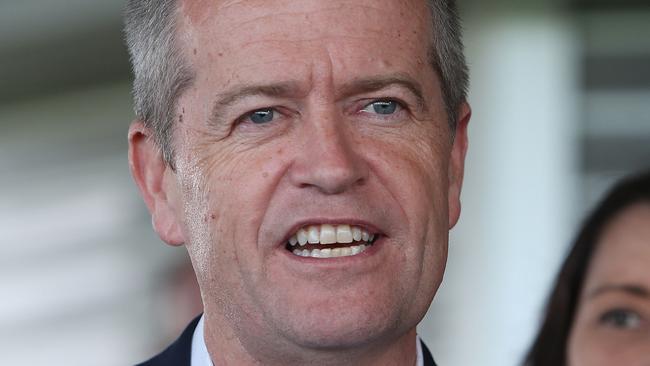Labor’s carbon knockout for top companies
Australia’s top companies will be hit with bills up to $1.6bn each to meet Labor’s emissions targets.

Australia’s top companies — including food manufacturers, miners and retailers — will be hit with carbon bills ranging from several millions dollars to up to $1.6 billion each to meet Labor’s emissions-reduction targets by 2030, according to a government analysis of the policy based on a future international carbon price of $62 a tonne.
MORE : Federal Election 2019
Resources giant Chevron is estimated to be facing a $1.6bn liability under a phased-in target, while Alcoa could be forced to buy $867 million in credits if it is unable to reduce its emissions by 2030.
Retail food group Woolworths could be up for $77m in credits, which industry experts have warned could affect the price of food, while BlueScope steel’s liability could be as high as $890m over the 10-year horizon.
The Australian revealed last week that the cost to business to meet Labor’s targets of a 45 per cent reduction in 2005 emission levels could be as high as $25bn based on a future international carbon price of $50 a tonne.
Bill Shorten has disputed the numbers but has not said what Labor’s policy forecasts on costs will be.
The dispute hinges on Labor’s plans to reduce the current safeguard mechanism that imposes penalties on companies that produce more than 100,000 tonnes a year of carbon emissions, to 25,000 tonnes a year.
The policy claimed this would capture 250 of Australia’s top companies which would be forced to reduce their emissions or buy offsets, including international carbon credits.
The current 100,000-tonne safeguard covers 140 companies but is rarely, if ever, triggered by the government, which shifts the baseline to avoid having to heavily penalise companies that go over it.
The government has been accused of watering down the safeguard by allowing companies to claim exemptions for a range of reasons, including the expansion of their business.
Labor’s policy will lower the threshold capturing more companies but will more aggressively police the safeguard to ensure compliance.
The Opposition Leader has dismissed suggestions an international carbon price will be above $60 a tonne by 2030 — despite the figure being regarded as a conservative estimate in modelling by former government scientist and contributing author to the International Panel on Climate Change Brian Fisher.
Josh Frydenberg yesterday said analysis done by his policy team confirmed the bill over the decade could be between $13bn and $26bn for businesses’ obligations triggered under Labor’s policy.
The figures for individual companies are based on their annual emissions as recorded by the Clean Energy Regulator and working on an assumption that they would have to purchase international credits to meet their obligations under Labor’s 25,000-tonne safeguard.
Scott Morrison yesterday continued his climate attack on Mr Shorten, warning voters that the Labor leader could not “explain his emissions-reduction policies”.
“There’s the cost he won’t explain on his emissions-reduction policies, particularly up there in Queensland … where GetUp is going around trying to take away people’s jobs,” the Prime Minister said.
“Bill Shorten — who is the godfather of GetUp — needs to explain why he cannot tell people what the cost of his emissions-reduction policies are,” he said.
Mr Shorten said economist Warwick McKibbin, on whom he was relying to defend his emissions policy, had this week made it clear that the “debate about cost … isn’t the main game”.
“What he said to do is you have got to compare the cost of not taking action on climate change in 2030 with the cost of taking climate action,” Mr Shorten said. “And what he said is have a look at the detailed policies. Labor’s got policies. So let’s once and for all … put a stake into that argument.”
Greens leader Richard Di Natale said Labor wasn’t “serious about tackling dangerous climate change”, attacking Mr Shorten’s $1.5bn plan to unlock gas reserves in northern Australia.
“We are in the middle of a climate emergency and we can’t be opening up any more coal, oil or gas fields if we are going to hand over a sustainable environment to our children and grandchildren,” he said.
“Australia’s fastest-growing source of emissions is leaking methane from gas projects.
“Labor’s plan will simply add to Australia’s growing emissions when they need to be going the other way.”




To join the conversation, please log in. Don't have an account? Register
Join the conversation, you are commenting as Logout